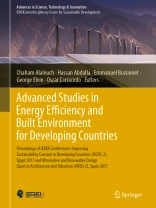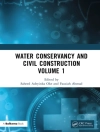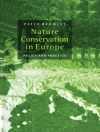This edited volume consists of three parts. It is a culmination of selected research papers presented at the second version of the international conference on Improving Sustainability Concept in Developing Countries (ISCDC) and the second version of the international conference on Alternative and Renewable Energy Quest in Architecture and Urbanism (AREQ), organized by IEREK in Egypt, 2017. It discusses major environmental issues and challenges which threaten our future. These include climate change impact, environmental deterioration, increasing demand for energy and new approaches for alternative renewable energy sources which became a necessity for survival. In addition to addressing the different environmental issues witnessed today, research presented in this book stressed on the need of sustainably shaping buildings and cities using renewable energy sources. Topics included in this book are (1) Resilience in the Built Environment, (2) Design for energy-efficient architecture and (3) Alternative and Renewable Energy Resources Quest in Architecture and Urbanism. The book is of interest to researchers and academicians who continuously aim to update their knowledge in these fields, as well as decision makers needing the enough knowledge to carry out the right decisions towards the benefit of the environment and society.
Table des matières
Sustainability Concept in Developing Countries.- Urbanism and Sustainability concept.- Energy & Sustainability Concept.
A propos de l’auteur
Dr. Chaham Alalouch is an architect, researcher and educator with a background in urbanism. He is concerned about how to improve people’s quality of life through sustainable built environment. He believes that the built environment (building and cities) is made for people and it should be designed and constructed as such. Dr. Chaham’s research was recognized for excellence. His Ph.D. was awarded the Mac Farlane Prize by Heriot-Watt University in the UK, and one of his peer-reviewed journal papers was awarded the Highly Commended Award at the Emerald Literati Network Awards for Excellence, UK. He has authored and co-authored more than 20 articles, technical reports and a book covering a wide range of topics related to this broad area of interest such as healthcare building design, privacy, spatial experience of space users, space syntax, restorative environments, stakeholder’s involvement in the design process, and passive and sustainable design and construction.He is also a member of Oman eco-house project and currently undertaking research in architectural pedagogy and “livability” of eco-architecture. Dr. Chaham held invited talks and keynote speeches at several international conferences. He also acts as a reviewer for a range of reputable journals, and as a scientific responsible for a number of international design schools, demonstrating academic leadership. He is currently teaching and researching at Sultan Qaboos University in Oman, having previously researched and taught at universities in the UK and Syria. There, he also worked in several architectural consultancy firms and in two European commission-funded projects, namely STRABON (Multilingual and Multimedia Information System for Euro-Mediterranean Cultural Heritage and Tourism) and HERCOMANES (Heritage Conservation and Management in Egypt and Syria). Dr. Alalouch is the Series Editor responsible for book proposals submitted in the field of Sustainable Architecture and Urbanism, and Architectural Heritage.
Professor Hassan Abdalla is an international authority in the field of Sustainability, Engineering Design, Factories of the Future, Artificial Intelligence in Design, and Future Smart Cities. He has over 20 years of experience in both academia and industry. He is a Fellow of the Royal Society for the Encouragement of Arts, Manufacture and Commerce, Fellow of the IMech E and Principal Fellow of the Higher Education Academy. He was awarded a Medal of Appreciation by the IMS Centre in Tokyo, which is run under the auspices of the Japanese Government, in recognition of his innovation and substantial contribution to the international collaboration with Kajima Corporation, Hazama Corporation, University of Tokyo, and Waseda University. He is the author and co-author of over 100 papers published in international journals and conferences worldwide. He is currently the Dean of the School of Architecture, Computing and Engineering (ACE) at the University of East London and visiting Professor at Cranfield University. Professor Abdalla is the Series Editor responsible for evaluating book proposals submitted in the field of Sustainability and Artificial Intelligence in Design.
Doctor Emmanuel Bozonnet is Associate Professor at the University of la Rochelle in France. He has more than 10 years of academic and professional experience in building engineering physics and civil engineering. He specialized in building energy in his studies on building interactions with urban microclimate and on urban street canyons on a district scale. This modeling work has been corroborated by various scale experiments from the building envelope component to the development of a reduced-scale mock-up for urban canyons and in situ buildings. Moreover, Dr. Bozonnet has more than 50 publications in the field, including articles, book chapters and academic papers. His publications and studies focus on the development of cooling strategies to mitigate for building energy demand and urban heat islands. Dr. Bozonnet is also involved in various scientific conference committees and in project management. He contributes to the board of IBPSA France (International Building Performance Simulation Association) and to the board of the ECRC (European Cool Roof Council). He is also co-leader of the group on urban microclimate and energy in the research federation IRSTV (Institute for Research on Urban Sciences and Techniques, France). Dr. Bozonnet is the Series Editor responsible for evaluating book proposals submitted in the field of Urban Planning, Sustainable Development and Energy Management.
Dr. George Elvin is an Associate Professor of Architecture at North Carolina State University, where his research and teaching focus on architecture for extreme environments. He is the author of over 40 books, chapters and articles, and has delivered lectures and workshops in over 20 countries. In 1981 he founded his own design-build firm, and in 1998 received his Ph D in Architecture from the University of California at Berkeley. He has been an Assistant Professor of Architecture at the University of Illinois at Urbana-Champaign, an Associate Professor at Ball State University, and a Visiting Fellow at the University of Edinburgh’s Institute for Advanced Studies in the Humanities.
Oscar Carracedo; Oscar Carracedo is an Architect, Urbanist and Educator. He is currently Assistant Professor at the Department of Architecture of the National University of Singapore. He is the director of the DRIA-Designing Resilience in Asia Programme, and director of the Inner Hoods Lab, where he develops his research on resilience, sustainability, integrated urban planning and informal urbanism. His expertise also includes health cities, and the relationship between urban development and wellbeing; and urban regeneration and development, with a special focus on developing countries. Oscar is the author of numerous books and articles, and drawn on his research he has recently published ‘Ibid. In the same place’, about on-site resilient revitalisation strategies for low-income neighborhoods, ‘Indushoods. From industries to Neighbourhoods’ a study on how to renew and reposition industrial areas, and ‘Naturban’ about the relationship and integration between urban and natural milieu in cities. Oscar is also co-founder director of CSArchitects, an urban planning, urban design and architecture firm based in Barcelona, Spain. In his more than 17 years of international professional experience he has been responsible of more than thirty masterplans, and a extense number of projects and consultancies in urban design; site, physical and spatial planning; architecture and public spaces, as well as many projects with underserved communities. Oscar has won two national urban planning and design prizes, more that forty national and international competitions, and his work and research has been awarded and published nationally and internationally.












